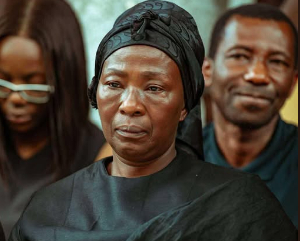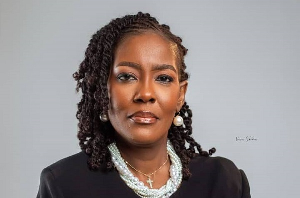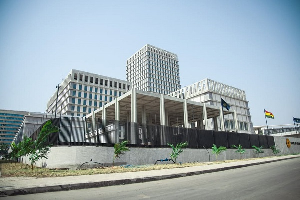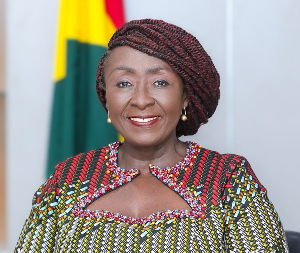Open Letter to:
The Honourable Minister of Roads and Highways,
The Honourable Minister of Local Government and Lands,
The Honourable Minister of Commerce and Industry,
The Honourable Minister of the Environment
cc. His Excellency President Atta-Mills
Dear Honourable Ministers,
Location of the Accra Mall
Christmas is just round the corner. Over two millennia, Christmas traditionally brings heavenly message of Goodwill to All Men (all Women included!) So, first of all, let me take this opportunity to wish you, Honourable Ministers and your families, the Season’s Greetings and Happy New Year!
This time of year is also important for temporal reasons. It is the time when your first-year performance report card falls due. Electorally, we the people of Ghana collectively are the ultimate judges of your performance in office, come 2012. In the interim, however, president Atta-Mills is your arbiter. Nonetheless, I trust and hope that you will all look back on your first year in office with satisfaction, that you have contributed your best towards laying the foundation stone for rapid and sustainable economic growth and social development for the benefit of all Ghanaians in the remaining three years of the Mills’ first government. At the same time, we should all bear in mind that very often in life one finds oneself in situations where one’s best may not always be good enough. As you probably learned in school--elementary, secondary or university--(I did), there is always room for improvement, however brilliant one might be. This is equally true of all human endeavours, including even bringing up one’s own family. Considering present living standard of ordinary Ghanaians, I believe that there is much room for improvement across the spectrum of government in which you now serve. It may be presumptuous of me, but let me advise you continue to do your best. Who knows? Your best may well turn out to be good enough in the end!
Now, let me explain why I specifically address this letter to you. I don’t know whether Your Honourable Ministers take time off occasionally from your heavy ministerial responsibilities to scan the Ghana Web. A couple of months ago, I posted two articles (vide Ghana Web Friday, 30 October 2009 and Ghana Web Thursday, 19 November 2009). In the first article in particular, I criticised the decision by the Kufour government for granting construction permit for the Accra Mall right on the shoulder of the Tetteh Quashie Roundabout. I queried the wisdom of that decision not out of any general political aversion to the NPP government, as some of my readers alleged. On the contrary, I did so as one of the innumerable suffering Ghanaian motorists who use those roads daily. There is absolutely no doubt that the construction of the Roundabout served real public interests: the need to decongest the horrific traffic jams that blighted motorists around there and beyond. But barely three years later that same Kufour government inexplicably took a decision that took us right back to where we were, worse at that. More mystifying is the fact that the consequences of that decision were easily predictable. One of my readers reminded me that there was a protest at the time against building the Mall there. (I didn’t recall the protest. I might have been out of the country at the time.) If there was indeed a protest, the Kufour government authorities obviously ignored it. My question then is the following: if the consequences of locating the Mall at that particular point were foreseeable why did the government not stop it or, at least, obtain a court injunction pending a review of all concerns? I can find no rational explanation for this, except to suspect vested economic interests of some high-ranking officials in the Kufour administration. If I am correct, then this was corruption.
The horrendous traffic problems created by the location of the Mall are a matter of public concern. Transparency and accountability in government, therefore, require that Ghanaians be given a full explanation as to why building permit was granted, in spite of the fact that the consequences were predictable. So, in my articles I sought: (a) to urge the government to make public the contents of the minutes of the meeting(s) leading to the decision to grant building permit; (b) to urge the government in light of this experience to adopt as soon as possible necessary legal measures making future projects of that size, whether public or private, subject to prior compulsory public hearing; and (c) to suggest that the owners of the Mall should reimburse the Treasury any funds the government might expend to restore the status quo ante at the Roundabout.
Given those three objectives, I thought a public judicial inquiry would be more appropriate, as it had several advantages over any other type of investigation. First, it would have the power to compel attendance of any person who might be able to provide useful information. Secondly, it would have the power to subpoena documents, which no ordinary or ministerial investigation could do. And, thirdly, its recommendations regarding adoption of legislation or similar regulations and/or other recommendations would have the weight of sound legal reasoning behind them. In spite of its obvious advantages, none of my readers supported this suggestion. Those who commented on it simply argued that it would be a waste of sources and time, without offering any alternative suggestions of their own. (As we learned from the BBC comedy series “Yes Prime Minister”, internal ministerial inquiries are almost invariably a whitewash. Many a serious matter said in jest! Remember president Mills’ security adviser’s investigation of former sports and youths minister Muntaka Mohammed? It was a blatant and shameful cover up for the ex-minister. Worse, the director-general and other officials were made sacrificial lambs or scapegoats!) This is why I write to you, Honourable Ministers, in the hope that you might be able to put me on the right track to get to the bottom of how that decision was reached.
Naturally, not every reader saw the problem of the Mall the way I did. Some thought that my first article was a politically NDC/ethnic-motivated attack on the NPP government. Nothing could be farther from the truth. I consider myself Ghanaian patriot, and I wish nothing short of the very best for my country and its people, irrespective of ethnic origin or political affiliation. My own experience abroad led me to the conclusion that Ghana could have managed its development programmes much better than we have been doing since our independence over half a century ago. (Apart from Nkrumah’s highly rational five-year development plans, our successive governments have had no clearly defined development plans, let alone any mechanism for measuring achievements against set targets and expenditure. (No articulated ideology or vision à la Obama. At best, they adopted an approach, which I may describe as “unprincipled pragmatism”, which led us nowhere.) It is excruciatingly painful how our politicians have over the years under-developed our country, through resources mismanagement, greed, selfishness, impunity and arrogant insensitivity to the plight of ordinary Ghanaians. Our present crop of politicians is no better than the generation that preceded it. (Oh, the less said about that conceited and silly deputy minister Hannah Bisiw the better. Given her public attitude about titles and recognition, she is obviously in the wrong job. President Mills should show her the door now before she causes any more embarrassment and outrage.) As some writers have already warned, exploitation of our oil bonanza will not be a panacea for our lamentable failure to develop. Some of our politicians are already scheming and jockeying for position in order to be able to “chop proper” when our oil revenue begins to flow into national coffers. Other Ghanaian patriots have said so before, but it bears repetition. Looking around, I do not see a better politician who could help fashion ironclad legal instruments for managing our oil revenue, including procurement and construction contracts, than president Atta-Mills. This is a tremendous responsibility, as well as an opportunity, for the president. And he cannot afford to fail. There is no margin of error. If he fails, history would be ruthlessly scathing when the time comes to render judgement on his legacy.
Other readers argued that the land on which the Mall stood was private property and that the owners had every right to do with it as they pleased, notwithstanding the fact that that use exacerbated traffic jams into, at and out of the Mall into Spintex Road. I am not sure that that argument is entirely tenable, and I should be grateful if Your Honourable Ministers would enlighten me on this. Meanwhile, my own view is that even if the land in question was private property, its use or development could not and should not be allowed to override the larger or general public interests. Here we have a situation where our government--NPP government--spent a huge amount of taxpayers’ money to construct a major roundabout in order to alleviate horrendous traffic jams. It makes no sense at all that the development of a nearby private land should be allowed to undermine government plan. So, my conclusion is that central government has a say in how private land around the area of the Tetteh Quarshie Roundabout is developed, as it should have in similar situations elsewhere.
I seriously believe that after 52 years of independence Ghana should now have legislation making public as well as private projects on the scale of the Accra Mall subject to prior compulsory public hearing. This seems the only way we can ensure that the possible effects of such projects on the life of the host community, the general public or the environment are thoroughly assessed and taken into consideration in their design and/or implementation. I may be wrong but I am not sure that Ghana has any such legislation or regulation at present, as I have never heard or read about a public hearing in respect of any major public or private project. This legal requirement is very common in Western European and North American countries. It ensures orderly, co-ordinated, mutually reinforcing and environmentally friendly infrastructure and similar developments. That is not the case in Ghana at present.
Still other dissenting readers advised me not blame the Kufour government for the location of the Mall but AMA officials who alone had power to grant or withhold building permits within the Accra municipality. Again, I am not entirely persuaded, at least not as far as the Mall is concerned. The Mall is not in the same category as, for example, a small residential building on a private plot nowhere near a major highway for which municipal authorities issue building permits. My argument is that given its size and location, the Mall raises entirely different considerations. To my mind, a project like that falls within the jurisdiction of several ministries: the ministry of roads and highways; the ministry of lands and local government; the ministry of commerce and industry; and the ministry of environment. In a situation such as this, it should not be so outrageous for one to expect input from some or all those ministries before a final decision is taken at central government level to grant or reject building permit.
Honourable Ministers, I should be interested to learn from you whether you think my three concerns, as outlined earlier, have any merits worth pursuing. If you think they have merits, would you please advise me the actions you plan to take in this regard and when that might be?
Thank you very much.
Yours faithfully
Cedric Tsuo
P.S. I wrote this piece late December 2009 but could not send it off because of computer problem. My apologies. CT.
Opinions of Monday, 4 January 2010
Columnist: Tsuo, Cedric
Open Letter to Ministers
Entertainment













